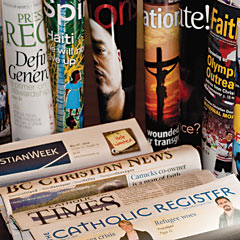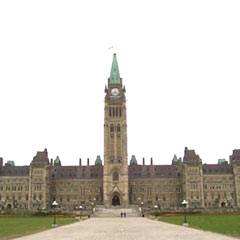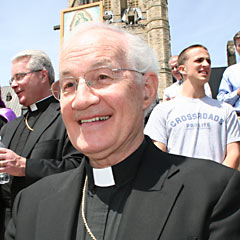Put people first
 The billion-dollar cost for the upcoming summits of world leaders is obscene and the disruption the meetings will cause is outrageous. Ottawa is rightly being roasted on those scores. But the real tragedy from the gathering of G8 and G20 leaders is that, once again, there seems to be a famine of big ideas among the world’s most powerful statesmen.
The billion-dollar cost for the upcoming summits of world leaders is obscene and the disruption the meetings will cause is outrageous. Ottawa is rightly being roasted on those scores. But the real tragedy from the gathering of G8 and G20 leaders is that, once again, there seems to be a famine of big ideas among the world’s most powerful statesmen.We’re not so naive to believe there are quick fixes for a world that is broken in so many ways. Most of society’s problems are either made or exacerbated by man. That is true whether speaking about oil gushing into the Gulf of Mexico, war in Afghanistan, famine and disease in Africa, poverty among North American aboriginal peoples, blockades in Gaza and international financial turmoil. The list goes on.
Seeking truth

What is the role of Catholic media in modern society?
Several hundred journalists from across North America were invited to ponder that question during the Catholic Press Association annual conference, held recently in New Orleans.
These have been difficult days for the Church and challenging days for Catholic media. Not only has the news been filled with stories of clerical sexual abuse and alleged Church coverups, but the technology-challenged Church hierarchy has often stumbled in offering a timely defence or authoritative explanation of Church positions.
Instant communication in a digital age has put pressure on traditional media such as newspapers and television to rethink how they conduct business. The result is often a softening of fundamental values as the old media strains to keep pace with the new, a manic technological beast of web sites, blogs and various social media tools that, collectively, disseminate information instantly but not always accurately.
Catholic bashing seems to always be fair game
There was nothing startling in either of the remarks, but one was shrugged off and the other drew an unusual degree of vitriol, highlighted by one columnist wishing the cardinal “a slow and painful death.” It was an extreme comment, but not exceptional in its derision.
In researching 25 years of anti-Catholic media hostility, I’ve been struck by how often Church participation in debates on the moral issues of the day spark such prejudice. The reaction is probably strongest on abortion, but also colours discussions about the re-definition of marriage, euthanasia, faith-based schools and bioethical research. No one minds too much when the Church tells us to help the poor, but statements about when life begins or what is meant by family are often lightning rods. Nor is prime time entertainment immune; while the Church is mostly ignored, script writers know they can always count on the Catholics when they need a tireless charity worker, a backdrop for sacred art and music or a deranged person to bomb an abortion clinic.
How I found the furnace of love of the Catholic Church
But words and images and gestures are the only things we possess to communicate our experiences to others. So I am using what I have, and will try to put into words what happened to me 12 years ago at the Marian shrine at Lourdes.
I do so because I have been asked, once again, to explain myself. This time the request came from a Christian acquaintance, appalled at the narrative of my conversion that appeared in The Globe and Mail on Holy Saturday. You may recall the op-ed piece. Its occasion was the sex-abuse accusations rocking the Catholic Church. Asked by The Globe whether these shocks had ungrounded my Christian faith, I tried to explain in the article why they had not.
The religious voice is one that needs to be heard
At a recent conference on religion and the media, a colleague from the Toronto Star announced his paper was getting rid of its full-time religion beat. That should have been a grand moment for me and the National Post, the paper I write for.
When he told the assembled group of about 50 esteemed representatives from various churches of the Star’s decision, it was a perfect opening for me to discuss how the Post was putting an even greater emphasis on religion. It was hard not to crow.
Don't fear faithful
 There is an unfortunate trend in Canada to try to deny religion its rightful place in the debating rooms of the nation.
There is an unfortunate trend in Canada to try to deny religion its rightful place in the debating rooms of the nation.We’ve seen this tendency manifest recently in the publication of an alarmist book about the so-called Christian right’s influence in Ottawa, in attacks on Cardinal Marc Ouellet for affirming Church teaching and, most recently, in shrill reaction after the head of Opus Dei accepted an invitation to dine on Parliament Hill with MPs.
Palmsonntag, a deeply biblical vision
Like some Baroque depiction of a saint’s martyrdom, Palm Sunday refers immediately to an occasion that lies largely beyond the margins of the work, in this case the liturgy for the Sunday before Easter.
If we can’t save the dolphins, what hope do we have ?
Each September dolphins are driven towards a cove on the Japanese coastline by fishing boats that lay down a “wall of sound” that serves to terrify the dolphins, which have acute hearing. Fleeing from the noise, the dolphins can effectively be herded into one small, secure cove at Taaji, where they are penned in by nets. Marine museums and commercial aquariums come to Taaji to select specimens for a lifetime of captivity. The dolphins that are not selected are slaughtered and their meat marketed through Asia, often misleadingly labelled as whale meat. The dolphins contain worrisome — indeed sometimes toxic — levels of mercury. Nevertheless, until recently dolphin meat was a staple in the compulsory lunches that Japanese schools provide to students.
Ethics and purpose must be returned to world finance
It appears that American banking giant Goldman Sachs thinks so and Federal Reserve Chairman Ben Bernacke isn’t sure. Yes, the Security and Exchange Commission has charged Goldman Sachs with fraud, but this is not the first time an investment institution has been raked over the coals, usually with very little result. Business as usual is not to be stopped.
Let there be light
 When children want to become magicians they are taught to say hocus pocus. When adults want to become politicians they are taught to say transparency and accountability. In both cases, the audience eats it up. Children, though, grow up to realize that people aren’t fooled by hocus pocus alone, while politicians never seem to learn.
When children want to become magicians they are taught to say hocus pocus. When adults want to become politicians they are taught to say transparency and accountability. In both cases, the audience eats it up. Children, though, grow up to realize that people aren’t fooled by hocus pocus alone, while politicians never seem to learn. Our elected representatives, regardless of party, are forever calling for government to be more open and transparent. They understand that voters want to know what their government is doing, how it is doing it and what it costs. Simple, really.
Leadership lacking in pro-life movement
 What a difference a year makes.
What a difference a year makes. The 2009 National March for Life in Ottawa drew a record 12,000 enthusiastic supporters but was virtually ignored by the media. Twelve months later, the annual March attracted roughly the same number of pro-lifers to Parliament Hill but this time earned national TV coverage and front-page headlines in some large dailies.

